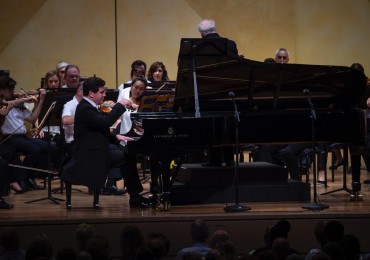At Ravinia, Russian Piano Master Pays Spellbinding Homage to Another

As an army of crickets decided to engage in one of its characteristics rackets, Denis Matsuev, the tall, powerfully built, 44-year-old Siberian-born pianist with a boyish grin strode onto the stage Wednesday at the Ravinia Festival along with the easily energetic 75-year-old conductor Leonard Slatkin.
And without a second of hesitation, the members of the Chicago Symphony Orchestra picked up their instruments, and Matsuev – backed by Slatkin’s precise, understated direction –launched into a spellbinding performance of Rachmaninoff’s “Piano Concerto No. 3.”
The concerto is awash in ravishing melodies and virtuosic thrills, and Matsuev brought such volcanic power, exquisite lyricism and absolute fluidity to the fiendishly demanding work that it felt as if he himself were writing the demonic piece on the spot. At the same time, the orchestra uncannily supplied just the necessary waves of sound needed to propel the whole vessel forward.
With Matsuev, Rachmaninoff (a similarly virtuosic pianist, who performed the debut of his own work in New York in 1909), has clearly found an ideal latter-day soul mate – one who can fully mesh the most muscular and romantic elements of the concerto. And don’t let the pianist’s big, strong hands fool you. The rippling speed, fluidity and lightness of his playing is astonishing, and thanks to the two large video screens on either side of the pavilion stage, the audience could get a close-up view of just how fleetly they moved. (Not surprisingly, the pianist has served as an artistic director of the Serge Rachmaninoff Foundation.)
The concerto, through which the piano plays almost nonstop, begins with great momentum, and Matsuev not only tapped into the subtly detectable Russian folk rhythms of the work, but at one point even suggested a slight hint of jazz (something he also has explored). Backing him at various moments were the excellent assistant principal bassoon (William Buchanan) and guest principal flute (Emily Skala), with fine work from the clarinets and horns as the pianist shifted seamlessly from hurricane force to the lightest, almost airborne sound.
In the second movement, the strings played a plaintive tune, with the piano in a more contemplative mood until another storm took hold and then transitioned into a lush romanticism set against the grandeur of the full orchestra. But following close behind all that rapture was a sequence of intense agitation on the keyboard.
The work’s third and final movement had weight, but never felt heavy. And then at one point the driving quality of the music seemed to float into the ether before the timpani sounded a brief hum and the piano made a slow, thoughtful “landing.”
Throughout, Slatkin used his graceful hands and expressive face with admirable understatement, and he and the orchestra were in sublime synchrony with Matsuev.
On the heels of multiple curtain calls and a long standing ovation, Matsuev, clearly in a mischievous mood, tore into two bravura encores. The first, Sibelius’ “Etude Op. 76 No. 2,” just flew off the keyboard with his light but rapid-fire fingering. Then came Grieg’s fabulously wild and demonic “In the Hall of the Mountain King,” played with an incomparable devilish speed and fury. The pianist’s grin was a clear sign he was having a wonderful time.
Hedy Weiss
« back



